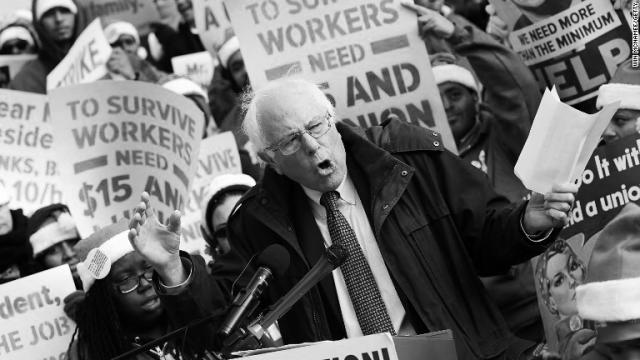
On Sept. 17, 2011 a group of protesters occupied Wall Street. Their unpolished campaign sought to draw attention to financial inequality. To healthcare issues. And to the problem of student debt.
If that sounds familiar, it is because four years on, Bernie Sanders’s own campaign has highlighted many of the same grievances. It is no coincidence. In 2015 many of the protesters who cut their teeth in the Occupy encampments are now campaigning for the Democratic candidate.
“There’s 50 million people who are impoverished here in America,” said Stan Williams, an Occupy Wall Street stalwart who is now co-organiser of African Americans for Bernie.
“He talks about the 99%. He talks about the 1%. So a lot of the things he talks about resonate with me.”
Occupy Wall Street sparked a nationwide movement in the US. Thousands of people camped in parks, outside capitol buildings and elsewhere while tens of thousands more took part in marches. A central theme was the perceived feather-handed treatment of banks and bankers who had contributed to the financial crisis, while conditions remained the same or worsened for regular citizens.
In New York, hundreds of people camped out in Zuccotti Park, a block away from Wall Street, and thousands took part in a series of marches throughout the city. Police across the US were frequently criticised for their attempts to control protesters. Videos emerged of peaceful demonstrators being teargassed in Seattle, Oakland, at UC Davis in California and in New York City – where one march saw more than 700 people arrested on the Brooklyn Bridge.
The Occupy movement quickly spread to countries across the globe including the UK, Brazil, Hong Kong and Australia, although the majority of the camps shut down towards the end of 2011.
At the time, Occupy protesters were criticised by some sections of the media for their lack of specific demands. But four years later protesters say the movement’s unorthodox style of campaigning has laid the groundwork for Sanders’s success, while Occupy’s network of activists are proving a major boon to what is a relatively impoverished campaign.
“He doesn’t have a big staff. He can’t afford to have the staff Hillary Clinton has,” Williams said. Williams was living in Alabama in September 2011 and moved to New York to be part of the movement. Williams now uses some of the skills he learned as an occupier to reach out to ethnic minority communities in a bid to spread Sanders’s message.
“The grassroots groups have far surpassed what he and his campaign could ever do. And since people who are involved in Occupy are leading the biggest group for Bernie Sanders, our fingers are all over this.”
Sanders announced his run for the Democratic nomination in May. A relative unknown then, the self-described democratic socialist has seen some of the most enthusiastic support of either Democratic or Republican candidates. More than 15,000 people turned up to a rally in Los Angeles in August, while a Portland event attracted 19,000.
The 73-year-old took the lead over Hillary Clinton in an Iowa poll for the first time in early September and leads the former secretary of state in New Hampshire.
But that success could not have happened were it not for the Occupy movement, said Charles Lenchner. He was involved in “TechOps” – a group of web-savvy occupiers who created websites and managed other technical aspects that helped give the movement its wide reach.
“Sanders’s rise in this election season is inconceivable without Occupy Wall Street having elevated the conversation around inequality and the way that the 1% are ravaging this country. You just can’t imagine one without the other.”
Lenchner co-founded People for Bernie Sanders, a group which supports the Vermont senator but that is unconnected to his campaign.
Another member of that group is Brett Banditelli, who serves as national digital organiser. Banditelli co-founded Occupy Harrisburg, a group that stayed camped outside Pennsylvania’s capitol building for more than a year before retiring in November 2012. He said Sanders’s support was boosted by the network of activist groups Occupy helped to establish across the country.
“There were hundreds of digital assets and small groups before Bernie even made his speech on the Vermont lake,” Banditelli said. “That was because a lot of occupiers and a lot of community activists across the country came out.”
If Sanders’s popularity could not have happened without Occupy, his platform also appears to have given occupiers a sense of purpose. He has also succeeded in drawing a notoriously disaffected group that had turned its back on traditional politics into participating in the political process.
“When we were in Occupy there was a lot of time arguing over should we vote or not. Now, that debate’s over. People realise that there’s a diversity of tactics, and voting is a part of that.”
3 WAYS TO SHOW YOUR SUPPORT
- Log in to post comments














